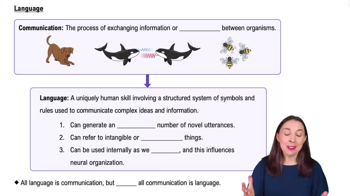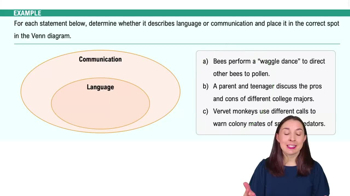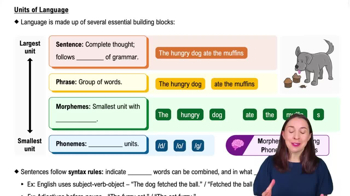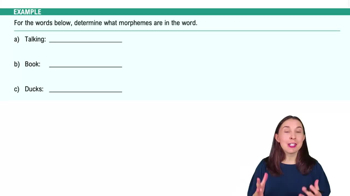Table of contents
- 1. Introduction to Psychology1h 43m
- 2. Psychology Research2h 20m
- 3. Biological Psychology2h 41m
- 4. Sensation and Perception28m
- 5. Consciousness and Sleep32m
- 6. Learning41m
- 7. Memory34m
- 8. Cognition37m
- 9. Emotion and Motivation35m
- 10. Developmental Psychology33m
- 11. Personality48m
- 12. Social Psychology41m
- 13. Stress and Health41m
- 14. Psychological Disorders44m
- 15. Treatment47m
8. Cognition
The Structure of Language
Struggling with Psychology?
Join thousands of students who trust us to help them ace their exams!Watch the first videoMultiple Choice
Zola states that morphemes are the smallest unit of language. Is this statement true? If not, how would you correct the statement?
A
Zola is correct.
B
Zola is incorrect: morphemes are the largest units of language.
C
Zola is incorrect: morphemes are the smallest unit of language with meaning.
D
Zola is incorrect: both morphemes and phonemes are the smallest unit of language.
 Verified step by step guidance
Verified step by step guidance1
Understand the concept of morphemes: Morphemes are the smallest units of language that carry meaning. They can be words themselves or parts of words, such as prefixes or suffixes.
Differentiate between morphemes and phonemes: Phonemes are the smallest units of sound in a language, but they do not carry meaning by themselves. Morphemes, on the other hand, do carry meaning.
Evaluate Zola's statement: Zola states that morphemes are the smallest unit of language. This statement needs clarification because it lacks the aspect of meaning.
Correct the statement: The correct statement should be that morphemes are the smallest units of language that carry meaning, distinguishing them from phonemes.
Conclude with the correct understanding: Zola is incorrect if the statement is taken to mean that morphemes are the smallest units without considering meaning. The correct understanding is that morphemes are the smallest meaningful units of language.







